|
|
|
Sort Order |
|
|
|
Items / Page
|
|
|
|
|
|
|
| Srl | Item |
| 1 |
ID:
184095
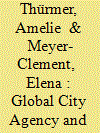

|
|
|
|
|
| Summary/Abstract |
Over the past few decades, cities have become increasingly active in global climate governance. Although most research on city agency has focused on democratic (often Western) cities, the climate-related activities of Chinese cities in global city networks have also expanded, raising the question of whether cities from nondemocratic political systems can be international actors or whether they are merely extensions of their national governments. This article examines how the Chinese Party-state’s institutions and governing instruments shape cities’ global agency and how these structures impact the work of various city networks operating in China. To this end, it analyzes policy reports, documents, and original interview data collected from city network representatives. The findings demonstrate that city networks in China walk a fine line between their door-opening function for cities to global climate governance and their role as transmitters of the central government’s gatekeeping function, thereby sustaining the hierarchical control structures of the Chinese Party-state.
|
|
|
|
|
|
|
|
|
|
|
|
|
|
|
|
| 2 |
ID:
184093
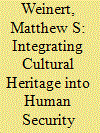

|
|
|
|
|
| Summary/Abstract |
The UN Development Programme introduced the human security concept in 1994 to address the diversity of challenges to people’s survival, livelihood, and dignity in seven key areas: personal, food, health, economic, political, community, and environmental security. A voluminous literature has since engaged its definitional parameters, theoretical implications, and practical applications. Yet neither dignity nor community security, defined in part to include cultural traditions and identities, have attracted much attention despite considerable human and community insecurities caused by assaults on cultural heritage which, as emblematic of distinctive cultural identities, have downward effects on dignity. This article aims to correct that gap. It identifies and examines three security markers to ascertain and redress the sufferance of indignities and insecurities pertaining to heritage, dignity, and community security: ensuring use of heritage; promoting its transmission; and protecting and advancing cultural rights.
|
|
|
|
|
|
|
|
|
|
|
|
|
|
|
|
| 3 |
ID:
184092


|
|
|
|
|
| Summary/Abstract |
This article focuses on the vast number of people who make global governance happen. It probes the role of the unknown people in the “middle” who are largely absent from scholarly gaze: professionals, service teams, and others who act behind the scenes. They are not at the top of public and private organizations (“global governors” in the literature), but they keep the lights on. They accomplish the policy, operational, and support work to move the needle of global governance institutions of all varieties from the local to global. These largely invisible and unheard populations—at least in the scholarly and policy literatures—make global governance work. The “missing middle” is not confined to the everyday contributions of professionals in intergovernmental secretariats because contemporary global governance is not synonymous with international organization, but concerns networked forms of public authority that may or may not include secretariats or states.
|
|
|
|
|
|
|
|
|
|
|
|
|
|
|
|
| 4 |
ID:
184094
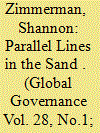

|
|
|
|
|
| Summary/Abstract |
UN peace operations are often accompanied by parallel forces from individual states, regional organizations, or “coalitions of the willing.” These forces remain distinct from the UN to address security concerns outside the remit of traditional peacekeeping. The deployment of UN stabilization operations, however, has resulted in an overlap between UN and parallel forces. This article investigates the complex relationships between UN stabilization operations and parallel forces using as examples the French and UN deployments in Mali and the Central African Republic. It concludes that when UN and parallel forces have distinct mandates, they often create military synergies but political tensions. In particular, when peacekeepers are reliant on parallel forces for military support, the UN can struggle to achieve its longer-term political tasks. When parallel forces are explicitly mandated to support UN efforts, the UN is better able to leverage its relationship with parallel forces to achieve its military and political objectives.
|
|
|
|
|
|
|
|
|
|
|
|
|
|
|
|
| 5 |
ID:
184096
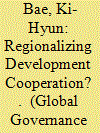

|
|
|
|
|
| Summary/Abstract |
This article investigates Association of Southeast Asian Nations (ASEAN)-level development cooperation, a relatively overlooked dimension in assessing regionalism in Southeast Asia, by examining the Initiative for ASEAN Integration (IAI). The IAI provides a unique case of experimenting with multilateral South-South development cooperation based on regional solidarity; however, despite the declared aspirations and commitments to the program, this article finds that the IAI’s actual development has been quite contrary to the declared goals. First, unlike what was expected, IAI has not been able to provide institutional benefits to help pool ASEAN-6’s resources regionally and coordinate their development programs. Second, the principle of solidarity made the IAI valuable, but it did not stand out in its actions. Third, although its primary goal was to narrow the gap among members, IAI ironically created unwanted diplomatic divide and discontent. The observations confirm a perspective that constructing ASEAN as a regional community is both driven and constrained by member states’ nationalistic priorities.
|
|
|
|
|
|
|
|
|
|
|
|
|
|
|
|
| 6 |
ID:
184097
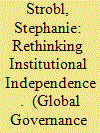

|
|
|
|
|
| Summary/Abstract |
This article examines institutional independence using the examples of the World Health Organization (WHO) and of the Public Health Emergencies of International Concern (PHEIC s) in a theoretical and a practical approach. It highlights the two different sources of authority of the WHO Secretariat, based on conditional negotiated legitimacy and epistemologically derived legitimacy, and how this authority is threatened by an increase in state party influence beyond what is envisaged in the WHO’s institutional setup. As a practical example, the article uses the PHEIC determinations, when the criteria as set out in the International Health Regulations (IHR) are not sufficient to explain the director-general’s decision to determine a PHEIC. Instead, this article offers evidence of state party influence. This challenge to the WHO’s legitimacy leads to a lack of institutional independence and, subsequently, to a declining basis for cooperation.
|
|
|
|
|
|
|
|
|
|
|
|
|
|
|
|
| 7 |
ID:
184091
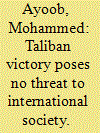

|
|
|
|
|
| Summary/Abstract |
At the very outset, I want to set to rest the myth that the Taliban takeover of Afghanistan poses a challenge to the international system as presently constituted. In fact, exactly the opposite is the case, for this event reinforces the Westphalian logic that, despite recent attempts to chip away at it, continues to form the basis of international order.
|
|
|
|
|
|
|
|
|
|
|
|
|
|
|
|
|
|
|
|
|